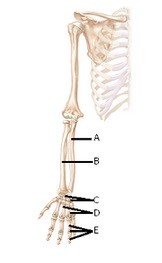Summarize the defecation reflex
What will be an ideal response?
The parasympathetic-mediated defecation reflex is initiated when mass movements force fecal material into the normally empty rectum. Stretch receptors transmit the sensation of rectal distention to the spinal cord. Parasympathetic neurons cause smooth muscle in the sigmoid colon and rectum to contract, and the internal anal sphincter to relax. Impulses from the cerebral cortex trigger relaxation of the external anal sphincter and contraction of the levator ani muscle. These combined movements allow the feces to pass and are assisted by contraction of the abdominal muscles against a closed glottis (Valsalva maneuver), which increases intra-abdominal pressure.
You might also like to view...
Which of the following is not a product of aerobic food catabolism?
A. Heat B. Carbon dioxide C. ATP D. Water E. All of these are products of aerobic food catabolism.
 The figure illustrates bones of the right upper limb. What does "A" represent?
The figure illustrates bones of the right upper limb. What does "A" represent?
A. Phalanges B. Ulna C. Radius D. Carpals E. Metacarpals
Identify the functions of the skeleton
What will be an ideal response?
What structure in the kidneys indirectly monitors blood pressure and triggers a hormonal response that helps regulate water and electrolyte reabsorption?
A. Afferent arteriole B. Peritubular capillaries C. Juxtaglomerular apparatus D. Glomerular capsule